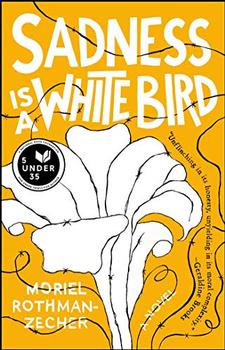Summary | Excerpt | Reading Guide | Reviews | Beyond the Book | Readalikes | Genres & Themes | Author Bio

Critics' Opinion:
Readers' Opinion:
First Published:
Feb 2018, 288 pages
Paperback:
Feb 2019, 256 pages
 Book Reviewed by:
Book Reviewed by:
Dean Muscat
Buy This Book
ONE
EVERYTHING WAS SALT AND SWEAT, summertime and sharpened swords. It was Friday, July 25th. The date of our catastrophe, Laith.
Or mine, at least.
Two days after my 19th birthday. Two days before I was sent here. One lifetime ago. Now, in the fluorescent glow of this jail cell, I can still feel echoes of the South Hebron heat on my skin. Mostly, the desert painted in shades of red on the canvas of my face, but when I looked in the mirror that morning, on July 25th, I thought I saw a faint hum of brown glimmering beneath the sunburnt crust, threading between the black and ochre tapestry of my almost-full beard. A twinge of Saba Yehuda's complexion, maybe. A twinge of my grandfather's Salonican toughness. You might not have recognized me. My scalp was a hedgehog. My eyes glinted strangely in the glass of the base's bathroom, yellow-green and nearly fearless.
We'd been in the Territories for almost a month by this point. One night, on guard duty outside the settlement of Kerem El, I pulled hair after hair out of my beard, just to stay awake. Afterward, back in my bunk, I wondered blearily if the Commander would notice patches and revoke my beard permit, make me shave it all off. He didn't. I kept the tiny, coiled hairs in my pocket for three days, until I came to my senses and realized how weird that was.
Patrolling the Palestinian villages in the area was more interesting. No
one else called them "Palestinian," of course: everyone said "Arab villages" or "enemy villages" or "Arab outposts." They were wobbly shanty-clusters that seemed like something you'd expect to find on the outskirts of Mumbai or Sao Paulo, only here there was no major metropolis in sight, just desert and the sprawling town of Yatta, whose economy was reportedly based on stolen cars and whose yellowish houses huddled together along the horizon's hills.
None of the South Hebron villages had running water or electricity. Eviad claimed that was how they chose to live—"It's their Bedouin culture, and shit"—but I was skeptical. I was usually skeptical when other Israelis spoke about Arabs. I was a discerning soldier, a different kind of soldier: ears always perked, eyebrows always raised. Almost always, at least. I remembered Kufr Qanut. I'd promised myself to sever my right hand, Laith, to suture my tongue to the roof of my mouth before I let myself forget: I was here to protect the Seven Other Villages, just like I told your sister I would be.
Some of the dusty children scampering between the tin-sided structures would ask us for candy during our patrols, and I'd give it to them when I had it. American candy too, that my dad brought back from a visit to our old home in Everbrook, Pennsylvania. I could feel through the wrappers how the heat turned the sweets gooey and soft, just like I liked them, but I didn't allow myself to open even a single package. They weren't for me. They were for the saucer eyes and twinkle laughs I'd get as I told the kids, in Arabic, not to eat all the candies at once, making a silly face to go along with my silly suggestion.
And then there were the dogs: chained to various desert shrubs, their rib cages bulging like broken accordions, raspy gurgles in their throats as they barked halfheartedly. They didn't seem threatening, the dogs or the villages, but still, in the back of all our minds (yes, even mine) were the stories: the shepherd Yaron Ben Yisrael, stabbed in the throat. The ambulance filled with explosives. The old farmer in the suicide vest. The ambush at the Sheep Junction in '03, where three guys from the Lavi unit were taken out in less than a minute. One moment: three boys laughing, pulling jackets tight, thinking about warm blowjobs and hot chocolate. Next moment: three corpses draped in torn olive green, blood coagulating in their chests alongside foreign lead and misplaced bone shards and half-baked hopes for the coming weekend and the one after that.
Excerpted from Sadness Is a White Bird by Moriel Rothman-Zecher. Copyright © 2018 by Moriel Rothman-Zecher. Excerpted by permission of Atria Books. All rights reserved. No part of this excerpt may be reproduced or reprinted without permission in writing from the publisher.





The Flower Sisters
by Michelle Collins Anderson
From the new Fannie Flagg of the Ozarks, a richly-woven story of family, forgiveness, and reinvention.

The House on Biscayne Bay
by Chanel Cleeton
As death stalks a gothic mansion in Miami, the lives of two women intertwine as the past and present collide.

The Funeral Cryer by Wenyan Lu
Debut novelist Wenyan Lu brings us this witty yet profound story about one woman's midlife reawakening in contemporary rural China.
Your guide toexceptional books
BookBrowse seeks out and recommends the best in contemporary fiction and nonfiction—books that not only engage and entertain but also deepen our understanding of ourselves and the world around us.